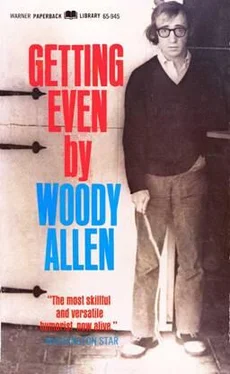Two Parables
A man approaches a palace. Its only entrance is guarded by some fierce Huns who will only let men named Julius enter. The man tries to bribe the guards by offering them a year’s supply of choice chicken parts. They neither scorn his offer nor accept it, but merely take, his nose and twist it till it looks like a Molly screw. The man says it is imperative that he enter the palace because he is bringing the emperor a change of underwear. When the guards still refuse, the man begins to Charleston. They seem to enjoy his dancing but soon become morose over the treatment of the Navajos by the federal government. Out of breath, the man collapses. He dies, never having seen the emperor and owing the Steinway people sixty dollars on a piano he had rented from them in August.
*
I am given a message to deliver to a general. I ride and ride, but the general’s headquarters seem to get farther and farther away. Finally, a giant black panther leaps upon me and devours my mind and heart. This puts a terrific crimp in my evening. No matter how hard I try, I cannot catch the general, whom I see running in the distance in his shorts and whispering the word “nutmeg” to his enemies.
Aphorisms
It is impossible to experience one’s own death objectively and still carry a tune.
*
The universe is merely a fleeting idea in God’s mind-a pretty uncomfortable thought, particularly if you’ve just made a down payment on a house.
*
Eternal nothingness is O.K. if you’re dressed for it.
*
If only Dionysus were alive! Where would he eat?
*
Not only is there no God, but try getting a plumber on weekends.
Yes, But Can the Steam Engine Do This?
I was leafing through a magazine while waiting for Joseph K., my beagle, to emerge from his regular Tuesday fifty-minute hour with a Park Avenue therapist-a Jungian veterinarian who, for fifty dollars per session, labors valiantly to convince him that jowls are not a social drawback -when I came across a sentence at the bottom of the page that caught my eye like an overdraft notice. It was just another item in one of those boiler-plate specials with a title like “Historagrams” or “Betcha Didn’t Know,” but its magnitude shook me with the power of the opening strains of Beethoven’s Ninth. “The sandwich,” it read, “was invented by the Earl of Sandwich.” Stunned by the news, I read it again and broke into an involuntary tremble. My mind whirled as it began to conjure with the immense dreams, the hopes and obstacles, that must have gone into the invention of the first sandwich. My eyes became moist as I looked out the window at the shimmering towers of the city, and I experienced a sense of eternity, marvelling at man’s ineradicable place in the universe. Man the inventor! Da Vinci’s notebooks loomed before me-brave blueprints for the highest aspirations of the human race. I thought of Aristotle, Dante, Shakespeare. The First Folio. Newton. Handel’s Messiah. Monet. Impressionism. Edison. Cubism. Stravinsky. E=mc 2…
Holding firmly to a mental picture of the first sandwich lying encased at the British Museum, I spent the ensuing three months working up a brief biography of its great inventor, his nibs the Earl. Though my grasp of history is a bit shaky, and though my capacity for romanticizing easily dwarfs that of the average acidhead, I hope I have captured at least the essence of this unappreciated genius, and that these sparse notes will inspire a true historian to take it from here.
1718: Birth of the Earl of Sandwich to upper-class parents. Father is delighted at being appointed chief farrier to His Majesty the King-a position he will enjoy for several years, until he discovers he is a blacksmith and resigns embittered. Mother is a simple Hausfrau of German extraction, whose uneventful menu consists essentially of lard and gruel, although she does show some flair for culinary imagination in her ability to concoct a passable sillabub.
1725-35: Attends school, where he is taught horseback riding and Latin. At school he comes in contact with cold cuts for the first time and displays an unusual interest in thinly sliced strips of roast beef and ham. By graduation this has become an obsession, and although his paper on “The Analysis and Attendant Phenomena of Snacks” arouses interest among the faculty, his classmates regard him as odd.
1736: Enters Cambridge University, at his parents’ behest, to pursue studies in rhetoric and metaphysics, but displays little enthusiasm for either. In constant revolt against everything academic, he is charged with stealing loaves of bread and performing unnatural experiments with them. Accusations of heresy result in his expulsion.
1738: Disowned, he sets out for the Scandinavian countries, where he spends three years in intensive research on cheese. He is much taken with the many varieties of sardines he encounters and writes in his notebook, “I am convinced that there is an enduring reality, beyond anything man has yet attained, in the juxtaposition of foodstuffs. Simplify, simplify.” Upon his return to England, he meets Nell Smallbore, a greengrocer’s daughter, and they marry. She is to teach him all he will ever know about lettuce.
1741: Living in the country on a small inheritance, he works day and night, often skimping on meals to save money for food. His first completed work-a slice of bread, a slice of bread on top of that, and a slice of turkey on top of both-fails miserably. Bitterly disappointed, he returns to his studio and begins again.
1745: After four years of frenzied labor, he is convinced he is on the threshold of success. He exhibits before his peers two slices of turkey with a slice of bread in the middle. His work is rejected by all but David Hume, who senses the imminence of something great and encourages him. Heartened by the philosopher’s friendship, he returns to work with renewed vigor.
1747: Destitute, he can no longer afford to work in roast beef or turkey and switches to ham, which is cheaper.
1750: In the spring, he exhibits and demonstrates three consecutive slices of ham stacked on one another; this arouses some interest, mostly in intellectual circles, but the general public remains unmoved. Three slices of bread on top of one another add to his reputation, and while a mature style is not yet evident, he is sent for by Voltaire.
1751: Journeys to France, where the dramatist-philosopher has achieved some interesting results with bread and mayonnaise. The two men become friendly and begin a correspondence that is to end abruptly when Voltaire runs out of stamps.
1758: His growing acceptance by opinion-makers wins him a commission by the Queen to fix “something special” for a luncheon with the Spanish ambassador. He works day and night, tearing up hundreds of blueprints, but finally-at 4:17 A.M., April 27, 1758-he creates a work consisting of several strips of ham enclosed, top and bottom, by two slices of rye bread. In a burst of inspiration, he garnishes the work with mustard. It is an immediate sensation, and he is commissioned to prepare all Saturday luncheons for the remainder of the year.
1760: He follows one success with another, creating “sandwiches,” as they are called In his honor, out of roast beef, chicken, tongue, and nearly every conceivable cold cut. Not content to repeat tried formulas, he seeks out new ideas and devises the combination sandwich, for which he receives the Order of the Garter.
1769: Living on a country estate, he is visited by the greatest men of his century; Haydn, Kant, Rousseau, and Ben Franklin stop at his home, some enjoying his remarkable creations at table, others ordering to go.
Читать дальше












